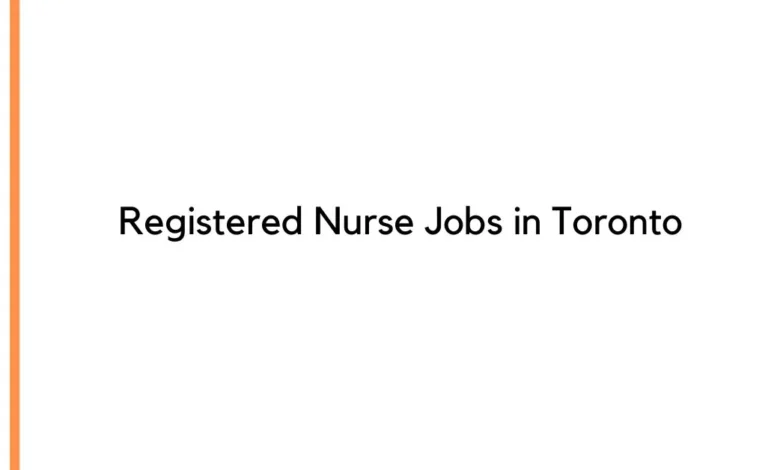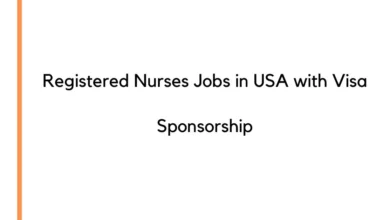Registered Nurse Jobs in Toronto 2025

For medical professionals looking to work in one of Canada’s biggest and most vibrant cities, registered nurse jobs in Toronto 2025 are a potential career option. Numerous hospitals, clinics, and specialised healthcare facilities can be found in Toronto, which is renowned for its top-notch medical services. As the healthcare industry grows due to an ageing population and the continuous expansion of medical services, there is a strong need for registered nurses (RNs). The prospects, prerequisites, and advice for landing a job as a registered nurse in Toronto in 2025 are examined in this guide.
Why There is Demand for Registered Nurse Jobs in Toronto
The demand for Registered Nurse Jobs in Toronto is driven by several factors:
1. Growing Healthcare Needs
- The need for healthcare services is only going to increase as Toronto’s population ages and grows. In a variety of medical settings, registered nurses are essential to patient care.
2. Expansion of Healthcare Facilities
- Toronto General Hospital, Sunnybrook Health Sciences Centre, and The Hospital for Sick Children (SickKids) are just a few of the city’s top medical facilities. As a result of these facilities’ expansion, registered nurses now have more employment options.
3. Diverse Patient Demographics
- There is a need for registered nurses with a variety of language and cultural abilities since Toronto’s multicultural population demands healthcare providers who can comprehend and meet a wide range of patient needs.
4. Shortage of Skilled Nurses
- Healthcare workers are in limited supply in Canada, especially in the nursing field. Hospitals and clinics are aggressively seeking qualified registered nurses to cover the deficit.
5. Emphasis on Specialized Nursing Care
- The demand for specialised nursing positions in fields including oncology, paediatrics, critical care, and mental health is rising as a result of improvements in medical technology and therapies.
Read Also: Health Care Support Worker Jobs In Canada
Salary
Given the strong need for qualified workers in the healthcare industry, registered nurse salaries in Toronto are competitive. Average yearly incomes consist of:
Entry-Level Nurses
- General Registered Nurse: CAD 60,000 – CAD 75,000 per year
Experienced and Specialized Nurses
- Pediatric Nurse: CAD 70,000 – CAD 85,000 per year
- Oncology Nurse: CAD 75,000 – CAD 90,000 per year
- Critical Care Nurse: CAD 80,000 – CAD 95,000 per year
- Mental Health Nurse: CAD 70,000 – CAD 88,000 per year
Responsibilities
In Toronto, registered nurses (RNs) are essential in giving patients top-notch care in a variety of medical settings. The following are typical duties performed by registered nurses in the city:
1. Assessing and Monitoring Patients
- Assessing patients: Registered nurses conduct comprehensive physical examinations and assess patients’ health.
- Vital sign monitoring: Registered nurses are in charge of keeping track of and documenting vital indicators such blood pressure, heart rate, temperature, and respiration rate.
- Health information documentation: They ensure effective communication among the healthcare team by accurately recording patient information and progress. information and progress, ensuring proper communication across the healthcare team.
2. Administering Medications and Treatments
- Medication administration: In accordance with medical directives, registered nurses give prescription drugs, injections, and therapies.
- Side effect monitoring: To ensure patient safety, they keep a constant eye on patients for any unfavourable reactions to drugs and therapies.
3. Developing Care Plans
- Working together with healthcare teams: Registered nurses develop patient-specific care plans in conjunction with physicians, specialists, and other medical professionals.
- Meeting medical and emotional needs: They make sure that, in order to provide patients with holistic care, the care plan takes into account both their physical and emotional needs.
4. Educating Patients and Families
- Educating patients and their families about medical illnesses, drugs, therapies, and lifestyle modifications that can improve patient outcomes is something that registered nurses do.
- Encouraging health literacy: They help patients make educated decisions by making sure they comprehend their ailment and treatment in its entirety.
5. Assisting in Medical Procedures
- Supporting medical procedures: RNs help physicians with examinations, surgeries, and medical procedures by setting up the tools they need and assisting with patient care.
- In order to reduce discomfort and anxiety, they make sure patients are positioned appropriately and comfortably throughout treatments.
6. Ensuring Patient Safety and Comfort
- Putting safety procedures into practice: To reduce the chance of infection or harm, registered nurses adhere to stringent infection control procedures and safety regulations.
- Comfort: They are committed to giving patients emotional support and comfort so they can relax while receiving care.
Requirements
In order to qualify for Registered Nurse (RN) positions in Toronto, applicants must meet a number of legal, certification, and educational requirements:
1. Nursing Education
- Candidates must have completed a recognised nursing program and earned a Bachelor of Science in Nursing (BScN) or an equivalent degree. Usually, this is an undergraduate program lasting four years.
2. Registration with the College of Nurses of Ontario (CNO)
- All registered nurses in Toronto are required to hold a licence from the College of Nurses of Ontario (CNO). In Ontario, this registration is required in order to practise nursing.
- For International Candidates: In order to be registered, those having nursing degrees from outside of Canada must have their credentials evaluated by CNO and fulfil extra requirements.
3. Relevant Work Experience
- Nursing Experience: Prior nursing experience is highly valued, particularly in specialised disciplines like paediatrics, oncology, critical care, or emergency care.
- Entry-Level Jobs: Although clinical or healthcare expertise may be advantageous, recent graduates are welcome to apply for entry-level registered nurse jobs.
4. Language Proficiency
- English language proficiency is required of nurses since it is crucial for communication with families, patients, and medical teams.
- Bilingualism: Although fluency in English is necessary, bilingualism (in both French and English) can be advantageous in some healthcare settings, especially in places with a varied population.
5. Additional Certifications
- Specialized Certifications: Having certifications in specialized areas, such as:
- Advanced Cardiac Life Support (ACLS)
- Pediatric Advanced Life Support (PALS)
- Basic Life Support (BLS)
- Certified Nurse in Oncology (CNO)
Benefits
Jobs for registered nurses (RNs) in Toronto are in high demand because of the many perks they offer. These benefits support both professional development and employment satisfaction. The following are some of the main advantages of RN positions in Toronto in 2025:
1. Competitive Salary and Benefits
- Competitive Pay: Depending on experience, specialisation, and geography, registered nurses in Toronto may expect to make between CAD $70,000 and CAD $90,000 annually. Nurses with greater experience and those in specialised positions can make much more money.
- Extensive Benefits Package: The majority of healthcare companies provide extensive benefit packages that include:
- Health and dental insurance
- Paid sick leave
- Retirement savings plans (e.g., RRSP)
- Disability insurance
2. Job Stability and Security
- great Demand: Because of Toronto’s ageing population, expanding healthcare demands, and growing population, nurses are in great demand in the city. Because there is a constant need for healthcare workers, the industry always provides employment stability.
- Permanent Full-Time Jobs: A lot of RN jobs are available as full-time, permanent employment, which offer stability and long-term career opportunities.
3. Professional Development and Career Growth
- Ongoing Education: Professional development options abound in Toronto. Numerous medical facilities and organisations offer workshops, continuing education courses, and assistance for further certifications.
- Opportunities for Specialisation: With further education and certification, registered nurses in Toronto can work in a variety of specialised fields, including paediatrics, cancer, critical care, emergency nursing, and more.
- Career Advancement: Nurses who gain experience can become charge nurses, nurse managers, or seek leadership positions in education or hospital administration.
4. Work-Life Balance
- Flexible Scheduling: A lot of Toronto’s healthcare facilities provide flexible work arrangements, such as part-time jobs, shift work, or the chance to work in clinics, hospitals, long-term care facilities, or home care settings.
- Paid Time Off: To ensure they have time to unwind and rejuvenate, registered nurses are usually granted paid vacation time, statutory holidays, and personal days.
5. Supportive Work Environment
- Collaborating with physicians, specialists, and other allied health professionals is encouraged by the multidisciplinary healthcare team that Toronto nurses are a part of.
- Mentoring and Support: To ensure a seamless transition into their positions, new graduate nurses frequently gain from mentorship programs and advice from more seasoned colleagues.
6. Access to Cutting-Edge Healthcare Technology
- Advanced Medical Facilities: Toronto is home to top-notch medical facilities that make use of the newest advancements in technology. Toronto nurses improve their abilities and knowledge by gaining expertise with state-of-the-art tools and procedures.
- Research and Innovation: For those interested in positions in academic hospitals or educational institutions, working in Toronto’s healthcare system offers chances to participate in medical research and innovation.
7. Diverse Work Environment
- ethnic Diversity: As one of the world’s most diversified cities, Toronto offers registered nurses the chance to work with patients from a variety of ethnic backgrounds. This diversity promotes a more welcoming healthcare atmosphere and enhances the nursing experience.
- Global possibilities: Toronto provides international nurses with the opportunity to work in a reputable healthcare system and acquire expertise that can lead to more possibilities across the globe.
8. Support for International Nurses
- Visa Sponsorship: To help with the immigration and licensing procedures, Toronto’s medical facilities frequently sponsor the visas of globally qualified nurses.
- Credential Recognition: To help international candidates fulfil the standards for practise in the province, the College of Nurses of Ontario (CNO) offers assistance in evaluating their nursing credentials.
9. Impactful and Rewarding Work
- Making a Difference: Being a registered nurse in Toronto offers the chance to truly impact patients’ lives. Because nurses are essential to patient care, recuperation, and general health improvement, the profession is extremely fulfilling.
- Job Satisfaction: Assisting others brings a sense of fulfilment to many nurses, especially in a vibrant and diversified healthcare environment like Toronto, where patients’ requirements are complicated and varied.
How to Apply
Conclusion
For medical professionals hoping to progress in a vibrant and diversified medical environment, registered nurse positions in Toronto offer a substantial chance. There are many positions available with competitive pay and the opportunity to work at some of Canada’s most prestigious healthcare institutions, as the need for nursing services grows as a result of an ageing population and a lack of qualified workers. Registered nurses can contribute significantly to patient care and establish a fulfilling career in one of Canada’s biggest cities by fulfilling the necessary requirements and applying through the appropriate channels.
Frequently Asked Questions
-
What is the salary range for registered nurses in Toronto?
Salaries for registered nurses in Toronto range from CAD 60,000 to CAD 95,000 per year, depending on experience and specialization.
-
What are the responsibilities of registered nurses in Toronto?
RNs in Toronto assess and monitor patients, administer medications, develop care plans, educate patients and families, assist in medical procedures, and ensure patient safety and comfort.



